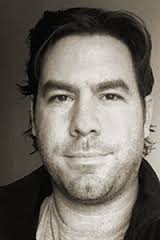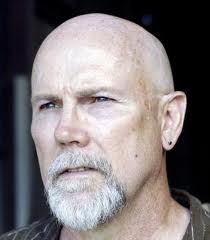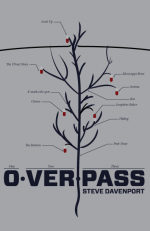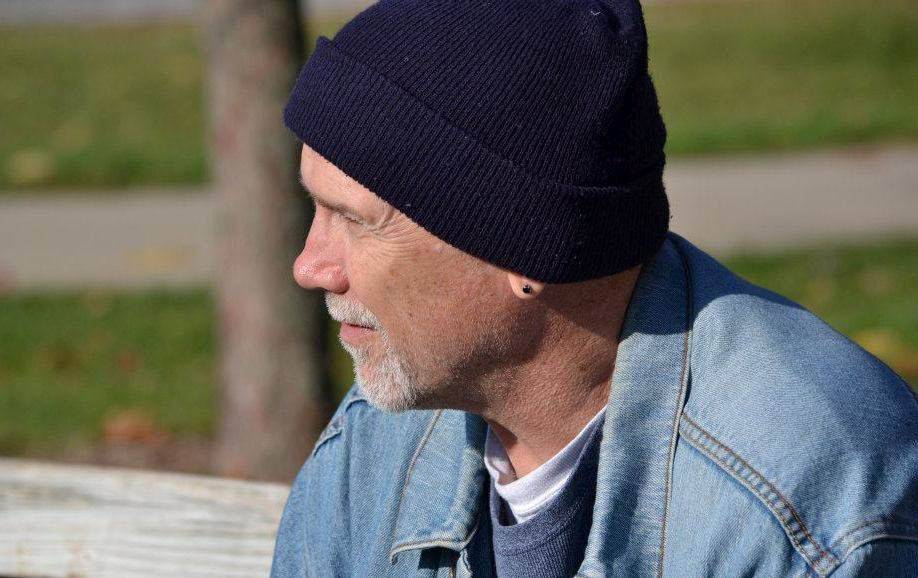If you’ve checked the Smile Politely SPlog lately, you’ll know that Stories & Beer will host a reading by local lit stars Lindsey Gates-Markel, Steve Davenport, and others this Saturday, March 29th. If you haven’t kept up on your Splog reading lately, it’s all happening at 5 p.m. for free. Go to Mike ‘N Molly’s and check it out.
In preparation for the blessed event, Clay Matthews, a pretty astute writer his damn self, interviewed Davenport.
Here’s how that went.
———
 Clay Matthews (pictured, left): In your latest book, Overpass, you work often in the curtal sonnet, a form invented by Gerard Manley Hopkins and a truncated version of the traditional 14-line sonnet. How do you balance the intensity of concision and curtailment—the tight, Hopkins-like ear—with the wild and sometimes filthy mouth (in all the good ways) of the voice of the American bottom?
Clay Matthews (pictured, left): In your latest book, Overpass, you work often in the curtal sonnet, a form invented by Gerard Manley Hopkins and a truncated version of the traditional 14-line sonnet. How do you balance the intensity of concision and curtailment—the tight, Hopkins-like ear—with the wild and sometimes filthy mouth (in all the good ways) of the voice of the American bottom?
Steve Davenport: I seek a rough mix. Yes to intensity and concision and how to make those work in wildness that seems better suited to other forms of music. I’m a troubled formalist who’s been sending two-fisted thanks to distant master Hopkins since the beginning and full respect to Miles Davis and Uncle Tupelo, fellow sons of American Bottom, in the Overpass poems. If my rough mix seems an odd fit for poetry, maybe I’m getting something right. I have enough respect for the history and traditions of poetry to have no respect for safe expectations. Also, Clay, fuck cancer.
Matthews: Your poem “People” outlines the story of two babies—one black, one white — taken into the bluffs by mosquitoes. The poem ends with the speaker’s daughter saying “I bet they changed skin, she says, / up there, the babies.” In your Black Guy Bald Guy stories, too, you approach questions of race directly and unapologetically. This is a very lengthy way of getting to this question: how do you view the relationship of writing to race? What are your hopes for it? Your frustrations?
 Davenport (pictured, right): Brother, I’ve been standing for a year or more on a soapbox talking about my hope that more white writers will include race in their work. Here’s a short essay that addresses that hope. Here’s a follow-up interview on that subject. Here’s an interview that I conducted around the same time with a favorite writer brave enough to confront racism in his and his family’s past. And here another writer friend, occasionally a model for Black Guy Bald Guy, writing about the many conversations we’ve had about the necessity for white writers to take on the difficult topic (apologies if there’s a firewall). While I’m going link-happy, I might as well invite readers to sample Black Guy Bald Guy at my website, both at the blog and here. And Clay, here’s a recording of the poem you quote, “People.”
Davenport (pictured, right): Brother, I’ve been standing for a year or more on a soapbox talking about my hope that more white writers will include race in their work. Here’s a short essay that addresses that hope. Here’s a follow-up interview on that subject. Here’s an interview that I conducted around the same time with a favorite writer brave enough to confront racism in his and his family’s past. And here another writer friend, occasionally a model for Black Guy Bald Guy, writing about the many conversations we’ve had about the necessity for white writers to take on the difficult topic (apologies if there’s a firewall). While I’m going link-happy, I might as well invite readers to sample Black Guy Bald Guy at my website, both at the blog and here. And Clay, here’s a recording of the poem you quote, “People.”
Matthews: You’re giving a reading this weekend. As a reader, what are your wildest hopes for what an audience (be it one person or a thousand) will walk away feeling or thinking after your reading?
 Davenport: Let’s not go to wildest, Clay. Let’s go with cool. How about the hand shoved at me after the first or second reading I ever did, a few of my words heavily inked in the palm? Or the conversation I had with a young writer who had clearly read my work ahead of time and wanted to talk about the uses to which formalism could be put? Or meeting the future publisher of Overpass after a reading in which she took first place and I was a runner-up? There are excellent moments that happen away from readings. The person who reads a poem on-line and writes an email or finds me via Facebook or Twitter. What’s cooler than that? Maybe the person who hears about Uncontainable Noise and decides he’s going to write more poems than Emily Dickinson and model every one of them after my syllabically controlled yodel sonnets. Maybe that is. It would also be cool if a couple of folks would go home and read some of the breast cancer poems in Overpass or think about how they might include race in a story or a poem. That might even be wild.
Davenport: Let’s not go to wildest, Clay. Let’s go with cool. How about the hand shoved at me after the first or second reading I ever did, a few of my words heavily inked in the palm? Or the conversation I had with a young writer who had clearly read my work ahead of time and wanted to talk about the uses to which formalism could be put? Or meeting the future publisher of Overpass after a reading in which she took first place and I was a runner-up? There are excellent moments that happen away from readings. The person who reads a poem on-line and writes an email or finds me via Facebook or Twitter. What’s cooler than that? Maybe the person who hears about Uncontainable Noise and decides he’s going to write more poems than Emily Dickinson and model every one of them after my syllabically controlled yodel sonnets. Maybe that is. It would also be cool if a couple of folks would go home and read some of the breast cancer poems in Overpass or think about how they might include race in a story or a poem. That might even be wild.
———
Steve Davenport is the author of two poetry collections: Overpass (Arsenic Lobster/Misty Publications, 2012) and Uncontainable Noise (Pavement Saw Press, 2006). His poems, stories, and essays have been anthologized, reprinted, and published in scores of literary magazines both on-line and in print. A story in The Southern Review received a 2011 Pushcart Prize Special Mention. His Murder on Gasoline Lake, published in Black Warrior Review and later as a chapbook by New American Press, is listed as Notable in Best American Essays 2007. He keeps a blog/website at http://gasolinelake.com/.
Clay Matthews has published poetry in journals such as The American Poetry Review, Black Warrior Review, Kenyon Review, Gulf Coast, and elsewhere. His most recent book, Pretty, Rooster (Cooper Dillon), is a collection of sonnets written in syllabics. His other books are Superfecta (Ghost Road Press) and RUNOFF (BlazeVox). He teaches at Tusculum College in Greeneville, TN, and edits poetry for the Tusculum Review.








